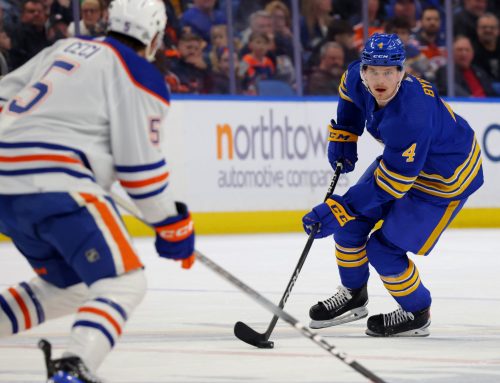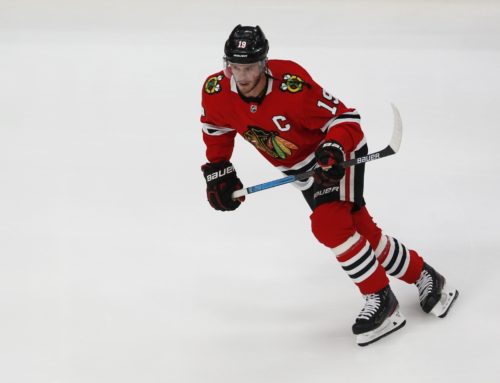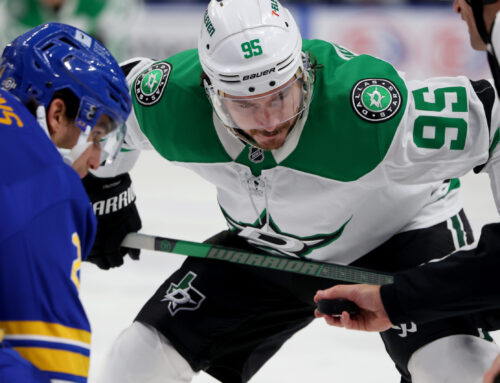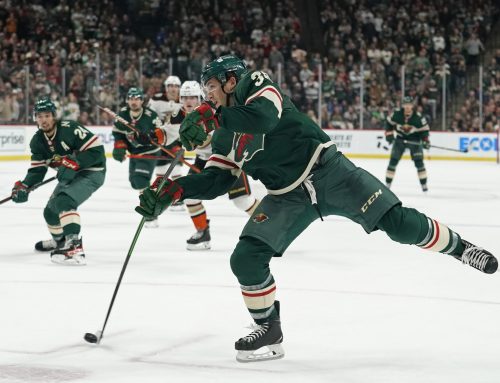June 24, 2014
Dobber Sports
2014-06-24
Greetings again! I'm back for a third straight Tuesday Ramblings. Hopefully you've enjoyed reading these as much as I've enjoyed writing them.
*
Some interesting developments in Philly yesterday, where new GM Ron Hextall is wasting no time getting his feet wet.
First, he traded Scott Hartnell to the Blue Jackets for previously rumored buyout candidate R.J. Umberger plus a fourth round pick in 2015. As usual, the analysis at DobberHockey was top notch. Personally, I like this trade for Philly, since as you'll read below there are at least a couple of reasons to be concerned about Hartnell's production for this season and beyond. Too bad the aftermath has gotten ugly.
Mere hours later it was announced that Hextall had inked Brayden Schenn to a two year, $5M extension. Schenn is right about where he should be in his development, although sometimes you can forget that since despite being only 22 it seems like he's been in the league for ages. Look for Schenn to take a run at 50 points as early as this season, with a chance to make a really big jump in 2015-16, which technically will be his magical fourth full season.
*
There was also the hiring of Willie Desjardins as coach in Vancouver. Beyond the already posted DobberHockey analysis, one interesting thing I dug up about Desjardins is that – at age 57 – he's not just one of the oldest current NHL coaches, but the few who are older first became an NHL coach at a younger age than 57. Could that be something which stands in the way of him connecting with younger players during the team's likely rebuild? Doubtful, but you never know.
*
As much as Andrei Markov re-signing with Montreal was likely the right move for both sides, I really had hoped he'd go to a team (like Edmonton) where his veteran presence and scoring ability would’ve made more of an impact. But now we can figure on Markov having a few more seasons like last one, getting somewhere in the neighborhood of 0.5 points per game, with 10-15 PP points.
Talking about Callahan like this makes we want to bring up two questions – (1) is the multi-cat forward era over, and (2) can players be too durable for their own fantasy good? I'll discuss both below.
*
I do wonder whether we've officially left the heyday of glorified multi-cat guys like Brown, Callahan, Clarkson, and new Blue Jacket Scott Hartnell. All of them have seen their points totals slide – if not drop like a rock – in the last year or two, and I think it's simply a case of their playing style coming back to haunt them once they hit (or approach) 30 years of age.
If I was a David Backes owner (he turned 30 in May), I'd prepare for the possibility of his offensive numbers starting to decline. Keep in mind that his 57 points in 74 games for 2013-14 was somewhat propped up by 30 points in his first 31 games. If you subtract that, you're left with 27 in 43 games, which projects to a more modest 51 point pace over 82 games. Hmmmm……
*
The second point is that while poolies appreciate grit and determination in their players, since it usually translates to better multi-cat stats, the problem is those traits often go hand-in-hand with playing hurt. And no poolie likes that.
Simply put – those who play hurt tend to produce worse when they do. Plus, if you don't know someone's playing hurt then you assume he's at 100%, when in truth he's not. And even if you know he's playing hurt you have to decide whether to swap in a player who's normally less productive but who might end up being better for your squad given the overall circumstances.
Every year I avoid drafting players with long active consecutive games streaks, since I figure they have to be playing hurt from time to time and I'd rather have a player who might take himself out of the line-up for a game or two to heal rather than playing through an injury and being less productive for several weeks because of it. For example, right now two NHLers have current consecutive games streaks over 500– Jay Bouwmeester (717) and Andrew Cogliano (540). Mark my words – you won't see either one on my roster next season.
On the flip side, now that Henrik Sedin's streak has ended, I'm actually more inclined to add him to my team than I would've been last season, and that's despite his very poor 2013-14 stats. My reasoning is he'll finally be willing to take off a game or two here and there, and his production should improve because of it. But it's sad to think of the toll that playing in so many games while not 100% took on his career, and how many more of these moments we may have missed in the past two seasons because of it:
*
Continuing my public service project on showing the benefit of advanced metrics in action, this time I'll again focus on forwards but instead examine 5×5 Offensive Zone Starting Percentage, which measures the percentage of a forward's shifts at five on five – other than on the fly changes and neutral zone faceoffs – that start in the offensive zone.
Here's a link from behindthenet.ca for the leaders in Offensive Zone Starting Percentage (OZSP) among the 152 forwards who played in 60+ games and averaged 13:00 or more of 5×5 ice time per game during 2013-14.
If a player was among the top 50 or so in OZSP yet still had an unproductive season then that's not a good sign, while if a player finished with 60 points or more (i.e., in the top 49 in scoring) despite being well outside the top 100 in OZSP, then that would suggest he'll do as well – if not better – in 2014-15.
Here are notables with a top 25 OZSP but who fell outside of the top 75 in league scoring for 2013-14:
Mike Ribeiro – 71.7% OZSP (1st on this list), 47 points (105th in the NHL); Brad Richards – 66.6% OZSP (4th), 51 points (80th); Brandon Saad – 63.7% OZSP (7th), 47 points (105th); Carl Hagelin – 62.4% OZSP (8th), 33 points (209th); Ryan Callahan – 59.9% OZSP (18th, 36 points (187th); Scott Hartnell – 59.5% OZSP (21st), 52 points (77th); Alexander Semin – 58.9% OZSP (25th), 42 points (135th)
Here are those who were in the top 35 in NHL scoring despite being outside of the top 100 for OZSP:
Phil Kessel – 80 points (6th in the NHL), 44.8% OZSP (136th on this list); Ryan Johansen – 63 points (34th), 45.1% OZSP (135th); Gabriel Landeskog – 65 points (30th), 45.9% OZSP (132nd); Patrick Marleau – 70 points (16th), 46.5% OZSP (127th); Joe Pavelski – 79 points (8th), 47.5% OZSP (119th); Ryan Getzlaf – 87 points (2nd), 48.5% OZSP (111th); Joe Thornton – 76 points (13th), 47.5% OZSP (118th Ryan O'Reilly – 64 points (32nd), 48.8% OZSP (108th)
For the first list, we can somewhat excuse Saad and Hagelin (younger players) as well as Callahan and Semin (only 65 games each); however, it's still not good to see any of them on the list. As for guys like Ribeiro, Richards, and, as I alluded to above, Hartnell, this serves as further confirmation that their best days are behind them.
On the flip side, although this is of course just one factor in overall production, nearly everyone on the second list should be a pretty good bet to equal or surpass his 2013-14 point total in 2014-15.
Hopefully over these past three weeks I've shown you some of the power (or at least usefulness) of advanced stats and metrics. Now it's up to you to decide if/how to use them in your leagues.
*
One last note on advanced metrics – in this case going back to IPP. When I was researching my Cage Match piece on Jason Pominville and Marian Hossa I found out that among those who played 1000+ minutes at 5×5 in 2013-14, Pominville was third in the entire NHL with an 86.1% IPP. And although I know I'm prone to overusing the term jaw dropping, what I noticed about who was in first place literally made….my….jaw…drop.
Get this – in 2013-14 Taylor Hall had 80 points (tied for 6th in the NHL), of which 62 were scored at even strength (4th in the NHL). And apparently 53 of those 62 points were tallied at 5×5. But what's truly amazing is that Hall's 5×5 IPP was 98.1%! That means Hall got a point on 53 of the 54 goals scored at 5×5 while he was on the ice! And if you look at players who skated for more than 1000 minutes at 5×5 during 2013-14, the next highest IPP was Alex Ovechkin at 87.9% – well less than Hall.
My first instinct was to predict a huge downward correction next season; but in 2012-13 Hall's IPP at 5×5 was 94.3%! So this wasn't a case of a one hit wonder – not at all.
In terms of an explanation, I think two things are at play. First, Hall is an amazing talent. To do this at all, let alone as a winger, is spectacular. But before we get too carried away, this accomplishment also was a function of Edmonton being a pretty bad offensive team, particularly on the blue line.
Right now Hall is the offensive anchor and catalyst for Edmonton both because he's great and because they essentially have no other choice. As the team improves (or should I say "if" instead of "as"?), you have to figure that other players – particularly defensemen – will begin to cannibalize Hall's IPP.
That being said, there's still good news in the bad news, since as Edmonton's scoring goes up (they finished 26th in 2013-14 in goals scored, and 20th in 2012-13), there'll be more goals in general, so even if Hall's IPP drops to a more modest 80-85%, he could still maintain similar (perhaps even increased) production if Edmonton only scores roughly 15-20% more goals at 5×5 while he's on the ice.
Long story short – Taylor Hall is a special player. And he's actually my choice for the next NHLer to pass the 90 point mark who hasn't done so already.
*
Until I'm back again with more Ramblings (TBD right now), you can always read my weekly Cage Match column. This week I'll be featuring two young but already elite wingers.





 CHI
CHI SEA
SEA FLA
FLA DAL
DAL WPG
WPG CBJ
CBJ L.A
L.A S.J
S.J N.J
N.J T.B
T.B
